Jacqueline Moore: Employers must be ready to take stock


To help the UK government determine future immigration policy, it commissioned the Migration Advisory Committee (MAC), an independent public body, to provide an evidence-based report on EU migration. The recommendations, published last month, relied on evidence from 250 organisations of varying sizes employing more than 114,000 workers across a range of sectors. While the UK government is not bound by the recommendations, it has broadly followed them in the past.
The MAC’s headline recommendation was that if the UK government is not constrained by a future deal with the EU, it sees no compelling argument for a preferential system for EU citizens. Instead, it recommended that, post-Brexit, EU citizens should face the same immigration rules as those from elsewhere. Following the MAC recommendations, it was widely reported that the Cabinet approved this proposal; however, this has yet to be confirmed.
Advertisement
Hide AdAdvertisement
Hide AdThe MAC also recommended against the introduction of a scheme for low-skilled workers, other than the Seasonal Agricultural Workers Scheme. Businesses, particularly those involved in food production and preparation, hospitality and social care, which rely heavily on EU workers, might struggle to meet their labour needs if the government follows this recommendation. Businesses reliant on low skilled EU labour should do all they can to retain existing staff, both from the local workforce and EU. In the case of EU workers who qualify for status under the EU Settlement Scheme, employers might consider following the Scottish Government’s lead and paying the £65 application fee as a tangible demonstration of their support. Employers should also consider the steps they can take to attract EU workers to the UK while free movement still exists (under the terms of the proposed transitional arrangement, until 31 December 2020).


The MAC also recommended the Tier 2 visa system should continue as the framework for skilled workers to enter the UK, despite high levels of dissatisfaction with the system among those surveyed for the report. The MAC attempts to address some criticism by recommending the skills threshold for a Tier 2 visa be lowered from its current level, NQF 6 (allowing for only degree-level jobs), to jobs at NQF Level 3, including a much wider skill base such as farm manager and hotel manager. However, the minimum salary threshold would remain at £30,000 for an overseas worker. Businesses that need to recruit less skilled workers, in sectors like hospitality and food manufacturing, will be concerned.
Businesses looking to recruit workers at or above the salary threshold might consider obtaining a Sponsor Licence. However, recent Home Office policy has been not to grant a Sponsor Licence unless the employer has identified a migrant worker they wish to employ. Also, if the MAC’s recommendations are followed, there is likely to be a sharp increase in Tier 2 visa applications. As a result, visa processing delays will be likely, unless Home Office staffing levels and funding increase. Building in visa processing times to recruitment planning will be key post-Brexit.
Two concrete proposals widely welcomed by business are the removal of the arbitrary Tier 2 cap, which means only 20,700 migrants can come to the UK from overseas each year, and the removal of the Resident Labour Market Test. The RLMT is onerous for employers, as it requires them to keep records that the test has been completed correctly years after the original recruitment has taken place.
Currently, employers have to pay a £1,000 annual levy for non-EU workers who come to the UK on Tier 2 visas. The MAC recommends this charge be extended to EU workers. This would be a significant new cost for employers. If implemented EU migrants would face, based on current charges for a three-year visa, fees of £610 for the Tier 2 visa and £600 to use the NHS. If accompanied by their family, each member, including children, would have to pay these fees. All employers should factor these new costs, increased administration times and potential delays into workforce planning.
The extent to which the UK government will follow the MAC’s recommendations is uncertain, but it has done so in the past. Therefore, employers, particularly those who rely on EU workers, would be well advised to take stock of the likely direction of travel and begin planning accordingly to mitigate the likely impact of these fundamental changes.
Jacqueline Moore is Head of Immigration at Shepherd and Wedderburn LLP